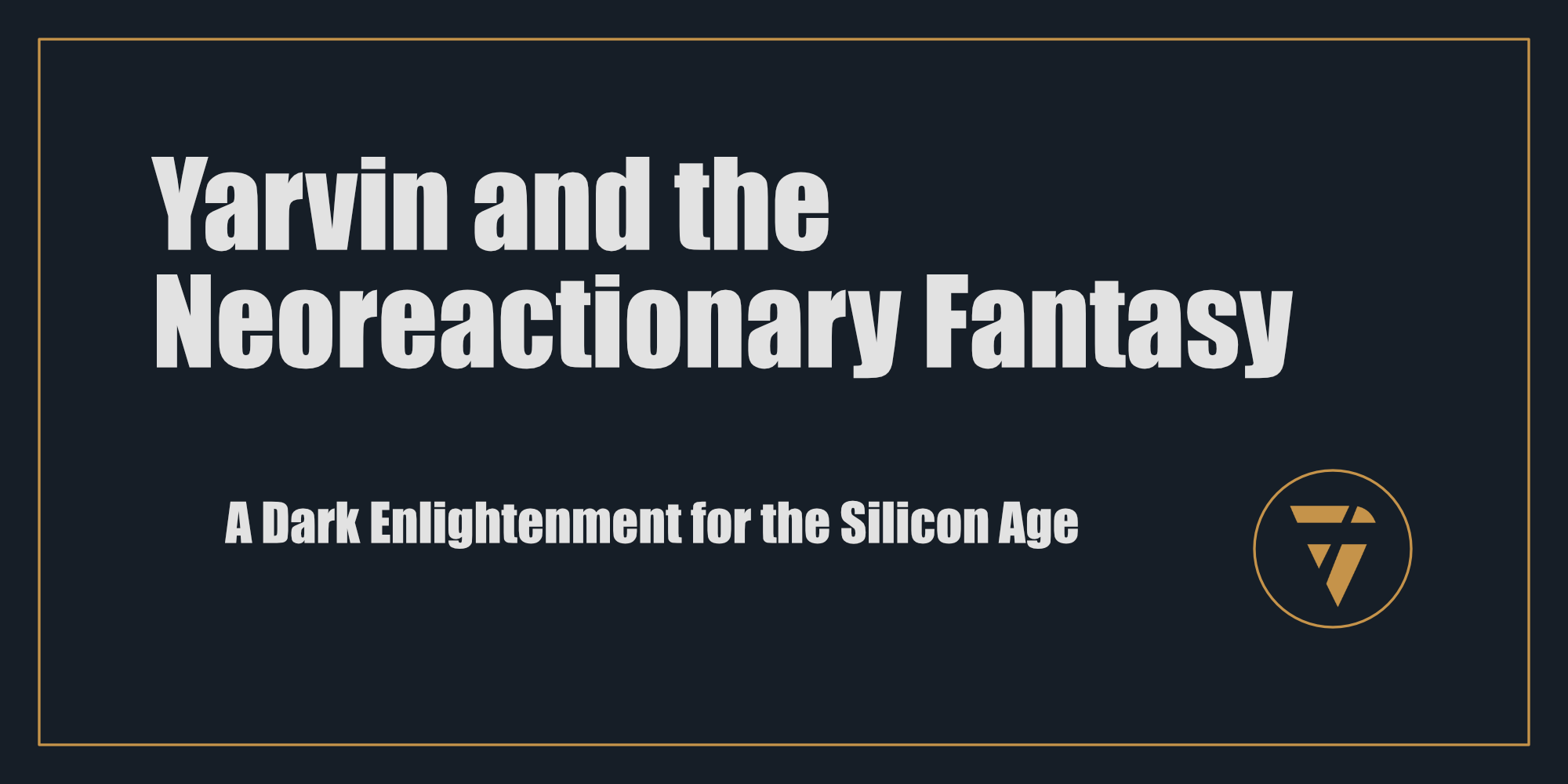Yarvin and the Neoreactionary Fantasy

A Dark Enlightenment for the Silicon Age
In the age of disillusionment with liberal democracy, where trust in institutions has eroded and billionaires experiment with political theory like it’s a venture-backed startup, Curtis Yarvin has emerged as a prophet of collapse. To his followers, he is a visionary offering a radical re-imagination of governance, a philosopher-king of the "Dark Enlightenment." To his critics, he is a software engineer with a messiah complex, dressing up authoritarianism in the language of efficiency.
The problem with Yarvin is not simply that his ideas are dangerous—though they are. The problem is that they appeal to the exact class of people with the resources and influence to try them out.
The Origins of a Reactionary Prophet
Curtis Yarvin, once a relatively obscure software engineer, gained notoriety in the late 2000s under the pseudonym "Mencius Moldbug." Through his blog, Unqualified Reservations, he developed what is now called the "Neoreactionary" movement (NRx), a rejection of democracy and an embrace of centralized, corporate-style governance. His intellectual project was, and remains, an elaborate justification for replacing democratic institutions with what he calls a “monarchy” but what functionally resembles a corporate dictatorship.
The premise is simple: Democracy is inefficient, corrupt, and obsolete. Instead, Yarvin argues, a society should be run like a startup—lean, centralized, and ruled by a sovereign CEO who wields absolute authority. The rationale? Decision-making is faster when one person is in charge. Progress happens when the market is unencumbered by elections, accountability, or public opinion.
It is a theory tailor-made for a certain subset of Silicon Valley elites—those who already see themselves as benevolent philosopher-kings, constrained only by bureaucracy, regulations, and the fickleness of the masses.
Why Now? The Rise of "Red Caesar" Politics
Yarvin’s ideas were, for a long time, relegated to the fringes of online political discourse, but something changed in the last decade. His work found an audience among a new breed of right-wing intellectuals, disillusioned with both the traditional Republican establishment and the perceived ineffectiveness of populist movements.
Figures like billionaire investor Peter Thiel—who has openly critiqued democracy as incompatible with progress—have been linked to Yarvin’s thinking. In the post-Trump era, where institutions are distrusted and elite power is concentrated in fewer hands, Yarvin's vision has found a foothold.
He has promoted the idea of a "Red Caesar"—a strongman who would seize control and permanently dissolve the administrative state. This figure, he argues, is not merely desirable but inevitable. America is collapsing under its own contradictions, and only through decisive, autocratic leadership can it be saved.
The echoes of Trumpism are undeniable. But Yarvin is not advocating for another chaotic, populist movement. Instead, he envisions something far more disciplined and totalizing: a controlled, technocratic coup in which the elected government is dissolved, replaced by an all-powerful executive who rules unchallenged.
Neoreaction in Practice: A Thought Experiment Turned Strategy
It would be easy to dismiss Yarvin’s ideas as theoretical posturing from an eccentric blogger, but in many ways, they are already being tested.
- The Trump-Era Purge of Bureaucracy – In 2020, Trump attempted to implement "Schedule F," an executive order that would have allowed the mass firing of tens of thousands of civil servants. The goal? To replace career bureaucrats with political loyalists—essentially a step toward neutering the independent administrative state, much like Yarvin has proposed.
- Silicon Valley as a Political Model – Many tech billionaires have embraced the idea that governance should resemble the startup world: visionary CEOs with unchecked power, no accountability to stakeholders beyond investors, and a ruthless efficiency in decision-making. Musk’s purchase of Twitter (now X) was a textbook application of Yarvinist philosophy—tearing down existing institutions and centralizing control in one individual.
- The Right-Wing Intellectual Shift – Conservative think tanks and media figures increasingly discuss the necessity of a “post-democratic” order. Figures like Sohrab Ahmari and the Claremont Institute have flirted with Yarvin-adjacent ideas—arguing that democracy itself is a liability, not a safeguard, against tyranny.
The difference between Yarvin’s fantasy and reality is that his vision demands an absolute break from the current system. Trump, DeSantis, Orbán, and other right-wing leaders have chipped away at liberal democracy, but none have fully dismantled it. Yet.
The Fundamental Flaws of Yarvinism
Like many anti-democratic theorists before him, Yarvin mistakes complexity for dysfunction and authoritarianism for efficiency. His theories rest on a number of flawed assumptions:
1. The Myth of the Benevolent Dictator
Yarvin insists that a single sovereign leader, unencumbered by elections or bureaucracy, would govern wisely and effectively. But history is full of absolute rulers who were incompetent, corrupt, or outright malevolent. The idea that concentrated power leads to good governance is contradicted by virtually every example of authoritarian rule.
2. The Fantasy of an "Exit" from Democracy
Yarvin imagines that America can simply “unplug” democracy like an outdated software program and install a new operating system. But political systems are not startups. They are deeply embedded social contracts, held together not just by law but by culture, identity, and centuries of precedent.
3. The Technocratic Delusion
A core appeal of Yarvin’s philosophy to tech elites is its promise that governance can be engineered, optimized, and rationalized like a piece of software. This reflects a fundamental misunderstanding of human societies, which are not coding problems to be debugged but complex, unpredictable systems driven by historical, economic, and psychological forces.
The Real Danger: Neoreaction as a Self-Fulfilling Prophecy
Perhaps the most insidious aspect of Yarvin’s philosophy is its implicit nihilism. He does not advocate for reforming democracy but for abandoning it entirely. His theory does not seek to improve governance but to declare its total failure, making radical authoritarianism seem like the only logical alternative.
This creates a feedback loop: The more elites embrace the idea that democracy is unworkable, the less they invest in maintaining its institutions. The more dysfunction is highlighted, the more plausible the case for a Yarvinist strongman becomes.
Yarvin is not just predicting collapse; he is actively encouraging a mindset that makes collapse more likely. And that is what makes his ideas so dangerous.
The Alternative to Neoreaction
Any critic of elite power would undoubtedly see Yarvin as just another in a long line of intellectuals who rationalize autocracy to serve the ruling class. The true problem is not democracy, but the concentrated power of unelected elites who already control wealth, media, and policy.
The answer to bureaucratic inefficiency is not a king, but greater democratic engagement. The response to elite capture is not authoritarianism, but mass political mobilization. The problem is not that people have too much say in their governance, it’s that they have too little.
Yarvin offers a philosophy tailor-made for those who already hold power and wish to formalize it, without the inconvenience of public accountability. But for everyone else, his vision is a warning. A future in which democracy is seen as a relic, where the only choice is submission to corporate kings.
It is not an inevitability. It is a decision. And it is one that can, and must, be rejected.
This is what I’m working on. Tell me what you think, I enjoy the conversation! Subscribe and follow the work in real time.
Thanks!
B

Democracy isn’t dying from inefficiency, it’s being strangled by those who call it obsolete. The answer isn’t a CEO-king; it’s breaking elite capture. Yarvin’s fantasy isn’t governance, it’s submission. Don’t let power rebrand tyranny as efficiency.
PS -






